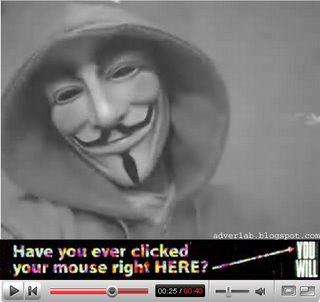Friday's
Wallstrip interview was with
Seth Goldstein. It was a fascinating discussion, where he laid out a vision for the future of the web.
Unfortunately, because of time constraints and in order to stay true to our show's tone, we were only able to slip a portion of the meat of the interview into the episode.
In case you weren't able to glean from the video - Seth is talking about attention in terms of giving (or even selling) your attention, not getting attention.
I'm interested in ideas about the future that envision
how we will do things, rather than exactly
what we will be doing.
I've talked
a lot about the potential of RSS. Most people who dismiss or don't understand RSS are looking at it as an "application technology" (a technology you use to
do something).
RSS interests me as a
background technology. In the same way that search changed the internet by answering the question "
How do I find what I'm looking for", RSS has the potential to revolutionize the interent by answering the question "
Once I find what I'm looking for, how do I hang onto it."
It has already started - in fact, you could argue that 2006 has been less about video and more about RSS - iTunes, YouTube, the Google Reader, widgets, gadgets, etc. People who see web 3.0 as the "
widgetized web" are predicting that RSS will become a critical component of how we interact with the web.
Last week, Seth talked about attention in the same terms, and that's what fascinated me about the discussion. Attentiontrust.org is about recognizing the value of
how you behave on the web, and part of that is recording your clickstream to build a data set about you. Once you have that data set, you can do a lot with it... you can sell it, you can combine it with other people's data to create a more valuable comparative data set, and you can share it with others.
"Who, besides a stalker, would want to look at someone else's clickstream" was the very logical question that
Lindsay asked Seth. The answer was, basically, that it doesn't matter "
what" you can do with it.
It's a way of thinking that can answer a "
how" question: "
How do I interact more meaningfully with people on the web?"
Clearly, that's what a majority of the users are looking for right now. Growth in web activity is being dominated by the social networking trend.
Seth gave an example, using technology that's available to all of us right now, that clicked on my lightbulb - maybe it'll do the same for you:
Seth recently decided to move to Mill Valley, CA after spending his adult life in New York. While his family was making their decision, he kept it a secret, and was careful not to record his visits to sites about the Mill Valley schools and real estate market. When the family was ready to announce the move, he simply added one tag to his del.icio.us stream: millvalleyschooldistrict.
Soon he started to get calls from friends who subscribe to his tag feed, asking if he was moving to California.
It's as if, by his behavior on the web and his decision to share that behavior, he had telepathically informed his friends of the decision to move. That's interesting.
Now expand that concept out to a future where the conscious steps in Seth's example were handled by web applications. So my application is constantly analyzing my clickstream data and, based on my parameters, observing and communicating my intentions.
Then, based on how much I've decided to share with my friend,
their application is analyzing my clickstream and making observations about me that are available to my friend.
Sure, there's been a lot of science fiction where people decide to open a door and it opens, or communicate with each other telepathically. This is the first time I've met someone who's shown me a path to that end that's in any way rational.
Is that really possible? I have no idea, and I don't even know if that's even part of Seth's project, or just my own interpretation. Clearly, I've thought about this idea a lot less than the impressive list of people involved with attentiontrust.org.
Regardless though, I found the interview to be a refreshing mix of imagination and critical thinking, and I am glad that Seth was willing to talk to us, and that Fred Wilson pointed us in his direction.
One are where Seth left me wanting more was privacy. To take ownership of your data means, to some extent, creating a record of you that would not exist but for your recording it. Privacy can be protected to some extent by limiting the exposure of your data... but aren't you, simply by creating the recording, leaving yourself vulnerable to people who can take your data without asking - by force of law or by brute force? Richard Nixon can tell you a thing or two about that.
It's an important question, one that Seth and his organization need to answer thoroughly if attentiontrust has any chance of gaining traction.
Look at what happened with facebook's friend monitoring feature... privacy is #1 concern for people when they're thinking about these issues, and it absolutely cannot be ignored or dismissed. It must be addressed.
 Embedded ads. My response is... duh. Anyone who's in the television business knows that embedded advertising works without seriously eroding the user experience. Why do you think the CBS bug (that's the term for the little graphic in the corner) sits there through all 46 minutes of CSI?
Embedded ads. My response is... duh. Anyone who's in the television business knows that embedded advertising works without seriously eroding the user experience. Why do you think the CBS bug (that's the term for the little graphic in the corner) sits there through all 46 minutes of CSI?














